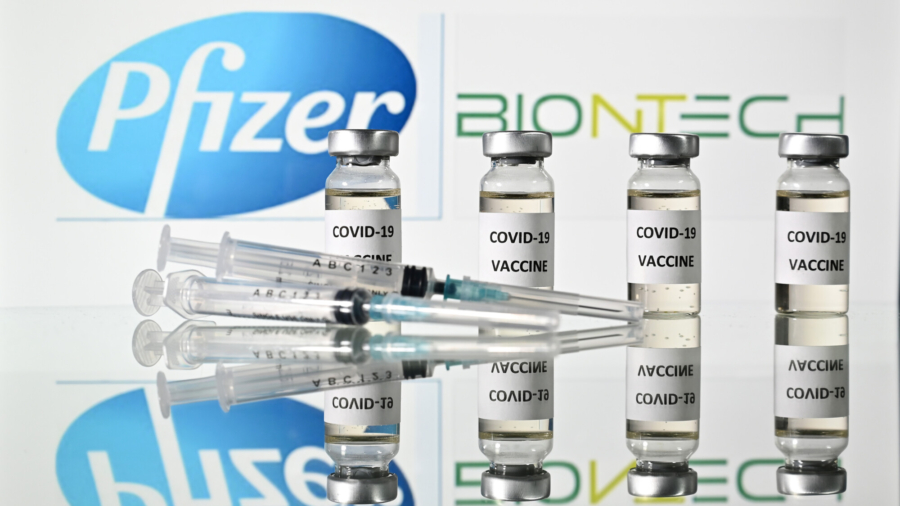WASHINGTON—A 23-member vaccine advisory panel voted on Dec. 10 to support the emergency use authorization (EUA) of the COVID-19 vaccine created by Pfizer-BioNTech.
The final decision and official authorization will likely be taken up quickly by the Food and Drug Administration (FDA), ultimately triggering a massive distribution effort.
The agency held an all-day public hearing before the committee voted 18–4 in favor, with one abstention, on the question: “Based on the totality of scientific evidence available, do the benefits of the Pfizer-BioNTech COVID-19 Vaccine outweigh its risks for use in individuals 16 years of age and older?”
The one abstention, Dr. Cody Meissner, professor of pediatrics at Tufts University School of Medicine, said the data doesn’t support the inclusion of 16- and 17-year-olds yet, but he agrees with the rest of the statement.
“We know about the safety of this vaccine up to 60 days,” Meissner said. “It’s hard to see a vaccine injury after 60 days. I think the safety is pretty well demonstrated. I’m comfortable.”
The U.S. government has pledged to distribute 2.9 million doses of the vaccine to the public within 24 hours of FDA approval.
President Donald Trump signed an executive order on Dec. 8 giving Americans priority access to COVID-19 vaccines. The ultimate decision on who gets the first doses rests with governors, Trump said the same day. The administration is encouraging governors to prioritize seniors and individuals who work with seniors.
The vaccine is purported to immunize against COVID-19, which is the symptomatic disease caused by the virus SARS-CoV-2. The likely regimen is for individuals to receive two doses, administered 21 days apart.
The FDA has jurisdiction to approve a new product under an EUA if a “chemical, biological, radiological, or nuclear agent can cause a serious or life-threatening disease or condition.”
The benefits of taking the product also need to be proven to outweigh the risks; the vaccine needs to show a certain efficacy, and there must be no “adequate, approved, and available alternative to the product for diagnosing, preventing, or treating the disease or condition.” The product would initially remain experimental and unlicensed.
The United Kingdom approved Pfizer’s vaccine last week and began administering doses on Dec. 8. But UK health officials were quickly left scrambling to reassure the public after two people had anaphylactic reactions to the vaccine, while a third reported a possible allergic reaction.
Updated guidance was issued late on Dec. 9 from the UK’s Medicines and Healthcare Products Regulatory Agency.
“Any person with a history of anaphylaxis to a vaccine, medicine, or food should not receive the Pfizer BioNTech vaccine. A second dose should not be given to anyone who has experienced anaphylaxis following administration of the first dose of this vaccine,” said Dr. June Raine, chief executive of the agency.
The FDA said it’s aware of the reports of anaphylactic reactions and will continue to monitor the situation. Moncef Slaoui, who is spearheading vaccine efforts in the United States, said on Dec. 9 that people with known severe allergic reactions should probably avoid the vaccine for now.
FDA officials suggested during the public hearing that a secondary study be conducted to test the vaccine specifically on individuals who have severe allergies. Officials also suggested that over time, children as young as 5 years old would be expected to be approved for the vaccine.
This week, reports from Pfizer’s clinical trials also revealed that four participants had suffered Bell’s palsy, which is the temporary paralysis of one side of the face, caused by a neurological reaction.
“Symptoms appear suddenly over a 48- to 72-hour period and generally start to improve with or without treatment after a few weeks, with recovery of some or all facial function within six months,” according to the website of the National Institute of Neurological Disorders and Stroke. “In some cases, residual muscle weakness lasts longer or may be permanent.”
The most common side effects reported in Pfizer’s clinical trials included injection site reactions (84 percent of people), fatigue (62.9 percent), headache (55 percent), muscle pain (38 percent), chills (31.9 percent), joint pain (23 percent), and fever (14 percent). Reactions were more severe after the second dose and in participants under 55 years.
Vaccine providers are required to report any serious adverse effects or vaccination administration errors to the Vaccine Adverse Event Reporting System, hosted by Health and Human Services.
Vaccine manufacturers are immune from liability for any adverse reactions.

This is the first time a vaccine has been developed for a coronavirus as well as the first time the FDA has approved a product that uses messenger RNA (mRNA) technology.
The mRNA’s purpose is to direct the body to make certain proteins. The immune system is then supposed to respond to those proteins by issuing a protective response if it encounters the COVID-19 virus.
Kathrin Jansen, Pfizer’s senior vice president and head of vaccine R&D, said mRNA vaccines can induce broad immune responses and can be “boosted repeatedly.”
During the public hearing portion of the FDA’s advisory meeting, presentations were a mix of praise for the speed and efficacy of the vaccine, and concern for yet unknown adverse reactions, as well as how to deal with hesitancy from the public to take the vaccine.
A poll published on Sept. 6 found that 21 percent of Americans would get a free vaccine as soon as possible, while 21 percent said they wouldn’t get the vaccine at all, and 58 percent said they would consider a vaccine but would wait to see how it had worked for others.
The FDA will consider granting an EUA to a vaccine created by Moderna on Dec. 17.
From The Epoch Times


